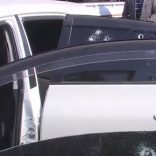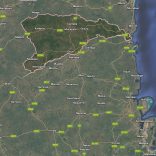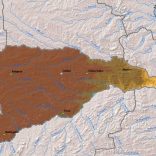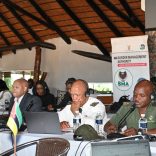South Africa: Police thwart smuggling attempt of 20 stolen vehicles from KwaZulu-Natal to Mozambique
“Cabo Delgado is at war and the province needs to be closed”

File photo: DW
- So says the coordinator of the Centre for Investigative Journalism in Mozambique, Luís Nhachote, who, in an interview with DW Africa, comments on the latest jihadist attacks on the village of Macomia and the action of the Mozambican army.
For journalist Luís Nhachote, the Mozambican state needs to show its sovereignty and fight the groups that are promoting terror in the northern province of Cabo Delgado.
In an interview with DW Africa, Nhachote spoke about the risk that journalists face to report violence in the region and also about the difficulties of the State, in the figure of the army, in fighting terrorists.
DW Africa: Based on what journalists know, are the attacks in Cabo Delgado a violent incident or a real war?
Luís Nhachote (LN): Cabo Delgado is at war. If we had the courage to change the Constitution to declare a state of emergency due to the pandemic, we can change this same [Constitutional] condition and declare a state of war in Cabo Delgado. The province needs to be closed, because it is a victim in the geopolitical context, in the global context, due to the resources it has.
It is an exported war, because we have vulnerable borders. The Mozambican Government must also approach the Government of Tanzania. Why has Tanzania been the corridor for people who come and go -either by [sea] the coast or by land and nothing happens? A number of small factors that seem to be marginal, but are extremely important, need to be resolved.

DW Africa: In your perspective, is there a danger, at this moment, of the State collapsing … of there occurring a dismembering, so to speak,, of the Mozambican national territory?
LN: The country is experiencing a war situation in Cabo Delgado, which has intensified in recent days. This is becoming very clear from the responses that the Government has given in relation to Cabo Delgado, and above all because the Government now uses the term “terrorists” and not “insurgents” – “insurgent” is a known face and this one is not known. But what we are seeing is that the viral videos, which are showing these young terrorists – who seem to me to be young -, show that they are in a situation of superiority. This is the truth.
DW Africa: How do journalists manage to work in these conditions? Can you go to the places, is it easy to investigate what is going on in those territories or is it practically impossible?
LN: It is a suicide. There is no journalist in the war territory. That is why the community radio journalists are there and they are the ones who give us information. And you will notice that Cabo Delgado has been the scene of the arrest of journalists recently. We had Amade Abubacar, who was arrested … We had Estácio Valói himself, and now we have Ibraimo Mbaruco. Journalism [report on Cabo Delgado] has been largely done on the basis of sources.
DW Africa: And the cell phone lines have been cut, which makes it even more difficult to collect information from the location itself, isn’t it?
LN: [The terrorists] are cutting the communication supply networks, the repeater antennas. It is very complicated to know what is going on because the districts and the localities are becoming silent, without communications.
DW Africa: In your view, is the solution primarily military, or are there other fields where the government and state bodies should act?
LN: The only solution that seems reasonable to me is the military. Mozambique has been living this war for three years, without anyone claiming it, unlike what is now happening with the alleged Islamic State.
There are a number of other things that need to be answered: how is our army prepared? Is the logistics limited? From what we are following, many young people [in the army] are recording videos to say that they are not in an egalitarian situation in terms of combat. These terrorists were better equipped than the Mozambican army itself. So, it is necessary for the State to rise to show its sovereignty.












Leave a Reply
Be the First to Comment!
You must be logged in to post a comment.
You must be logged in to post a comment.